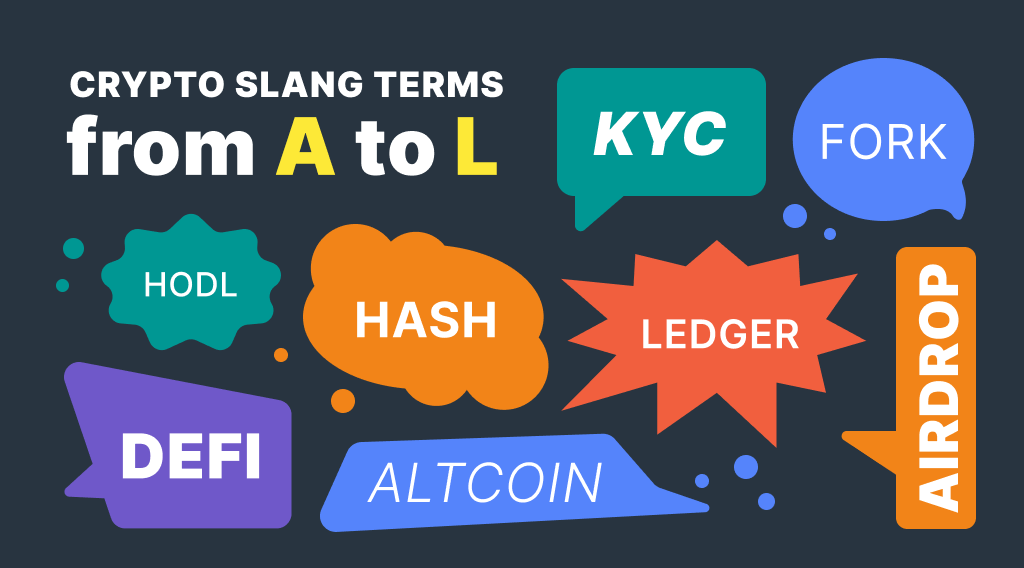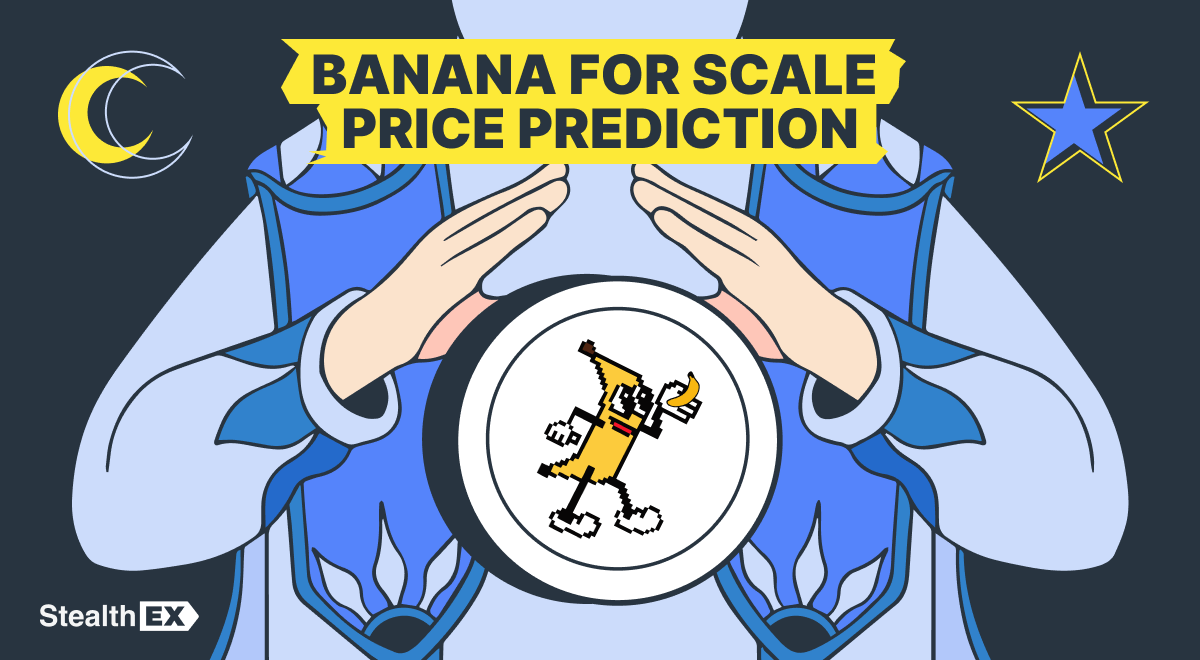A Guide to Popular Crypto Slang Terms, Part 1: from A to L

If you are a beginner in crypto forums, you may often come across unusual abbreviations or terms. As in any field, the crypto industry has its own set of slang phrases. In our previous articles, we covered a variety of animals in crypto investments. In this article, we’ll take a look at the most popular terms that will need some explaining. Here is our crypto slang terms list from A to L. Part 2 will explore crypto terms and definitions from M to Z.

Article contents
- 1 Crypto Slang Terms from A to L
- 1.1 Airdrop
- 1.2 Altcoin
- 1.3 ASIC
- 1.4 Bagholder
- 1.5 Buy the Dip (BTD)
- 1.6 CEX
- 1.7 Coin
- 1.8 Cold Wallet
- 1.9 Cryptosis
- 1.10 DAO
- 1.11 dApp
- 1.12 DeFi
- 1.13 Degen
- 1.14 DEX
- 1.15 Diamond Hands
- 1.16 DYOR
- 1.17 Fiat/Fiat Currency
- 1.18 Flippening
- 1.19 FOMO
- 1.20 Fork
- 1.21 FUD
- 1.22 Gas
- 1.23 GM
- 1.24 Hash
- 1.25 HODL
- 1.26 Hot Wallet
- 1.27 ICO
- 1.28 Key Private and Public
- 1.29 KYC/Know Your Customer
- 1.30 Ledger
Crypto Slang Terms from A to L
Airdrop
A cryptocurrency airdrop is a marketing strategy that involves sending coins or tokens to wallet addresses. Small amounts of the new virtual currency are sent to the wallets of active members of the blockchain community for free or in return for a small service, such as retweeting a post sent by the company issuing the currency. The ultimate goal of a crypto airdrop is to promote awareness and circulation of a new token or coin.
Altcoin
In crypto terminology, ’altcoin’ is a combination of two words: ‘alternative’ and ‘coin’. The term refers to any type of cryptocurrency other than Bitcoin. Many altcoins are built based on the basic structure provided by Bitcoin. Therefore, most altcoins are peer-to-peer, require a process of mining by which users solve difficult problems in cracking blocks and provide secure and inexpensive ways of carrying out web transactions. But altcoins, even with many overlapping features, vary widely from one another.
ASIC
This term refers to crypto mining. ASICs are application-specific integrated circuit mining computers that are designed specifically to mine cryptocurrency. Though any cryptocurrency that operates using Proof-of-Work can be mined using ASIC miners, they’re generally used for Bitcoin mining.
Bagholder
Being a bag holder is pretty straight forward. It is essentially a term for someone who is left holding the ‘bags’ after someone else has run off with the money. In the world of crypto, this is an investor or trader who has been holding (or hodling) a particular cryptocurrency for too long and now has to face the consequences of that decision.
Buy the Dip (BTD)
Buy the Dip or BTFD (Buy the F***ing Dip) stands for the process of buying an asset after it has declined in value. When it comes to the cryptocurrency market, ‘buy the dip’ is used to describe the opportunity of investing in a coin or token that has experienced a short or long-term decline in its price. By doing so, investors hope to profit from a potential future price increase, at which point they hope to ‘sell the top’.
CEX
CEX stands for centralized exchange. It is a business that provides you with a multitude of services such as a crypto trading platform (buy and sell transactions), account services (account funding and withdrawal), and customer support services. Centralized exchanges remain the most widely used method to buy and sell crypto. They are attractive to many crypto users since they are considered to be more convenient and easier to use than a decentralized exchange (DEX).
Coin
A coin is a cryptocurrency or digital cash that is independent of any other blockchain or platform. The key feature of a coin is that of a currency, and the term may also be used to describe a cryptocurrency asset that is not a token.
Cold Wallet
Cold wallets are digital cryptocurrency storage on a platform not connected to the internet, which protects them from hackers. The most popular are Ledger, Trezor, KeepKey, etc.
Cryptosis
‘Cryptosis’ is when someone is bitten by the crypto bug, and simply can’t shut up about it. The afflicted reads, writes, discusses, and otherwise consumes information about crypto all day, nonstop.
DAO
Decentralized Autonomous Organization (DAO) is software running on a blockchain that offers users a built-in model for the collective management of its code. DAOs are based on Ethereum smart contracts, which can be programmed to carry out certain tasks only when certain conditions are met.
dApp
A decentralized application (DApp, dApp, Dapp, or dapp) is an application that can operate autonomously, typically through the use of smart contracts, that run on a decentralized computing, blockchain, or other distributed ledger system.
DeFi
DeFi is short for ‘decentralized finance’. It is an emerging financial technology based on secure distributed ledgers similar to those used by cryptocurrencies.
Degen
The term ‘degen’ can be traced back to sports betting. Shorthand for ‘degenerate’, it’s generally used as an insult, referring to gamblers with a tendency to stake large amounts of cash without the knowledge or experience to back it up. In the crypto industry, this term refers to high-risk traders.
DEX
A decentralized exchange (better known as a DEX) is a peer-to-peer marketplace where transactions occur directly between crypto traders. Contrary to CEXs, DEXs aim to complete transactions more quickly and cheaply than their centralized counterparts. They do this by cutting out the intermediary entities that take a cut of transaction fees on CEXs.
Diamond Hands
The term Diamond Hands in crypto lingo is an expression that signifies a high risk tolerance. It refers to holding a volatile investment even when there’s pressure to sell. It’s popular with high-risk assets such as cryptocurrency and meme stocks. The opposite of Diamond Hands is Paper Hands, a term that describes someone who sells a stock too early.
DYOR
DYOR stands for Do Your Own Research and is a common phrase used by cryptocurrency enthusiasts.
Fiat/Fiat Currency
Fiat money is legal tender whose value is tied to a government-issued currency, like the U.S. dollar, while cryptocurrency is a digital asset that derives its value from its native blockchain.
Flippening
The term Flippening was coined in 2017 and refers to the possibility of the market capitalization of Ethereum (ETH) overtaking the market capitalization of Bitcoin (BTC).
FOMO
Fear of missing out, FOMO for short, is probably one of the most popular crypto terms that accurately describes the volatile crypto market. It’s the fear of missing out on something that others are enjoying, and it’s what causes people to buy at the top or hold during a dip after making profits. People can be said to get FOMO when they act on impulse due to the fear of missing out.
Fork
A fork happens whenever a community makes a change to the blockchain’s protocol, or basic set of rules.
FUD
FUD stands for ‘fear, uncertainty, and doubt’. It’s commonly exclaimed in crypto circles, is a psychological method of inspiring negative sentiment about a particular asset to prevent further buying or even instigate selling or short-selling. The objective is to suppress an asset’s price so the FUDer can accumulate at a lower price, or can inflict financial pain onto others that are holding the token for what may be a competing crypto project.
Gas
Crypto gas refers to the cost required to perform a transaction on the Ethereum network. Ethereum miners, whose equipment and power support the network, will set a price to perform computations based on supply and demand. When the demand is high, miners can ask for more in gas fees. When demand is low, gas prices usually fall.
GM
‘GM’ generally means ‘good morning’. However, in the crypto and NFT community, it expresses the idea that crypto and NFT owners and users are ‘early’ and that there is great promise for the industry, or at least a specific project in the industry.
Hash
A hash is a function that meets the encrypted demands needed to solve for a blockchain computation. Hashes are of a fixed length since it makes it nearly impossible to guess the length of the hash if someone was trying to crack the blockchain.
HODL
HODL is a term derived from a misspelling of ‘hold’, in the context of buying and holding Bitcoin and other cryptocurrencies long-term. It’s also commonly come to stand for ‘hold on for dear life’ among crypto investors.
Hot Wallet
A hot wallet refers to a virtual currency wallet that is accessible online, and it facilitates cryptocurrency transactions between the owner and end-users. A collection of private keys stored on a program connected to the internet is used to store and send different currencies such as Bitcoin.
ICO
ICO stands for ‘initial coin offering’, and refers to a formerly popular method of fundraising capital for early-stage cryptocurrency projects. In an ICO, a blockchain-based startup mints a certain quantity of its own native digital token and offers them to early investors, normally in exchange for other cryptocurrencies such as Bitcoin or Ethereum.
Key Private and Public
Private keys can be used for both encryption and decryption, while public keys are used only for the purpose of encrypting the sensitive data. Private keys are shared between the sender and the receiver, whereas public keys can be freely circulated among multiple users.
KYC/Know Your Customer
Know Your Customer (KYC) standards are designed to protect financial institutions against fraud, corruption, money laundering and terrorist financing. It is a form of identity verification required by many crypto exchanges since being imposed by regulatory agencies in 2017, and, in short, the mandatory process of identifying and verifying the client’s identity.
- No KYC for Buying Cryptocurrency. Some services, such as StealthEX, don’t require their customers to identify themselves in order to buy cryptocurrency.
Ledger
A public ledger derives its name from the age-old record-keeping system used to record information, such as agricultural commodity prices, news, and analysis. The public ledger was available for general public viewing as well as for verification. As cryptocurrency-based blockchain systems emerged, which rely on a similar record-keeping and public verification mechanism, the use of the public ledger gained popularity in the world of cryptocurrency.
This is our first article on crypto jargon featuring letters A-L. Part II will explore crypto slang terms from M to Z. Keep reading the StealthEX crypto blog to stay in touch with the latest news from the crypto market and its specific terms.
If you are looking to buy crypto safely, you can always use the user-friendly and non-custodial StealthEX crypto exchange platform. You can purchase crypto privately and without the need to sign up for the service. Our crypto collection has more than 600 different coins and you can do wallet-to-wallet transfers instantly and problem-free.
Just go to StealthEX and follow these easy steps:
- Choose the pair and the amount you want to exchange. For instance, BTC to ETH.
- Press the “Start exchange” button.
- Provide the recipient address to transfer your crypto to.
- Process the transaction.
- Receive your crypto coins.
Follow us on Medium, Twitter, Telegram, YouTube, and Publish0x to stay updated about the latest news on StealthEX.io and the rest of the crypto world.
Don’t forget to do your own research before buying any crypto. The views and opinions expressed in this article are solely those of the author.
altcoins crypto cryptocurrency adoption DeFi forkRecent Articles on Cryptocurrency
 Bakkt Files $1B BTC Buy, GameStop Raises $2.7B, Ripple-SEC End 5-Year Fight
Bakkt Files $1B BTC Buy, GameStop Raises $2.7B, Ripple-SEC End 5-Year Fight  Banana For Scale Price Prediction: Can BANANAS31 Coin Hit $1?
Banana For Scale Price Prediction: Can BANANAS31 Coin Hit $1? 
